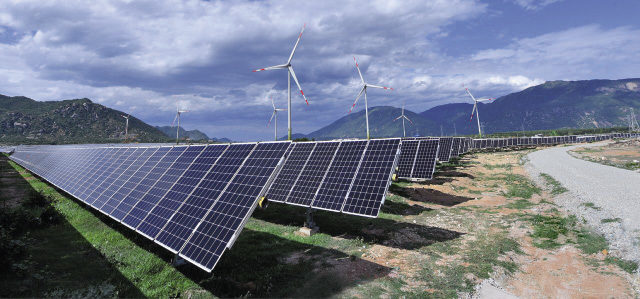Renewable energy could stabilize the currently volatile electricity markets and also protect against enormous price fluctuations in the future. This is the assessment of the European Commission in response to the persistently high energy prices worldwide.
For several weeks now, the view of rising prices on gas and electricity markets has become increasingly worrying. On October 13, Czech utility Bohemia Energy, which has around 900,000 customers, announced that it would shut down the group with immediate effect. Customers will now be supplied by an emergency supplier.
Against this background, the European Commission has adopted a communication on energy prices. This contains a “toolkit” from which member states can draw to curb the rapid rise in prices on the energy markets. The goal of the toolkit is both to address the immediate impact of the current price increases and to strengthen resilience against future price shocks.
“Rising global energy prices are a serious concern for the EU,” says Energy Commissioner Kadri Simson. “As we emerge from the pandemic and begin our economic recovery, it is important to protect vulnerable consumers and support European companies. The Commission is helping Member States to take immediate measures to reduce the impact on households and businesses this winter.
“At the same time, we identify other medium-term measures to ensure that our energy system is more resilient and more flexible to withstand any future volatility throughout the transition. The current situation is exceptional, and the internal energy market has served us well for the past 20 years. But we need to be sure that it continues to do so in the future, delivering on the European Green Deal, boosting our energy independence, and meeting our climate goals.”
Clean energy transition
The Commission's letter states that a transition to clean energy would be the best hedge against future price shocks. Therefore, in response to high prices, it proposes, among other things, more investment in renewables and accelerating renewable energy auctions and permitting processes. It also wants to speed up the expansion of storage capacities for both hydrogen systems and batteries.
There could also be some changes to the electricity market itself, as the European regulatory body ACER is to be tasked with examining the advantages and disadvantages of the current design of the electricity market. In the future, for example, the merger of renewable energy communities for local supply is to be regulated in a more accessible manner. In addition, the market for power purchase agreements (PPAs) between producers and end-users is to be further promoted through “flanking” measures.
“The current energy price crisis demonstrates the urgent need for businesses to invest in reliable, low-cost renewable electricity,” says SolarPower Europe CEO, Walburga Hemetsberg. “The European Commission has recognized the strategic importance of renewable Power Purchase Agreements for the continent and we look forward to the Commission's additional guidance on PPA frameworks to Member States before 2023. The good news is that PPAs and on-site sourcing is booming in Europe, for yet another record-breaking year. We can go even further and faster by accelerating the development of regulatory frameworks for PPAs, taking enabling measures like standardized contracts, and creating incentives for end-users.”
Power purchase agreements
Across Europe, record numbers of power purchase agreements (PPAs) covering 3.5 GW of capacity were signed this year – representing growth on the last eight years. SolarPower Europe expects a total of 407 GW of capacity to be created under PPAs by 2030. The PPA market is also picking up in Germany. According to a data survey by the consulting firm Enervis, 4GW of PV capacity in the PPA segment could receive their construction permits this year. In recent years, that number has been just 1-2 GW per year, according to Enervis.
Sustainable electricity and corporates’ critical solar role
However, even the PPA market is not completely protected from the current energy crisis. The turmoil in the energy market has had a negative impact on pricing in the PPA market this year. Compared to the last quarter, bid prices for the cheapest 25% of PPAs in Europe increased by 8%. That's according to a survey by renewable energy trading services provider LevelTen Energy. According to the data, the German and U.K. PPA markets were hit particularly hard compared to other European markets. Prices for PV PPAs in Germany rose 8.9% to €53/MWh compared to the last quarter. Power purchase agreements for wind rose by as much as 13.4% to €64.2/MWh.
The Commission's communication will now be presented to the European Parliament by Commissioner Simson. Also, at the meeting of the European Council on October 21 and 22, the averaging is to serve as a subject for the discussion over energy prices. On October 26, meanwhile, Simson will present the communication to the energy ministers. In addition, the Commission points out that it will seek ongoing discussions with decision-makers within the EU in view of the tense situation. It also wants to remain in contact with national authorities, industry, consumer associations, and international partners.
This content is protected by copyright and may not be reused. If you want to cooperate with us and would like to reuse some of our content, please contact: editors@pv-magazine.com.




Wow how clever is the EU commission, did they have special education Anybody with any intelligence knows more renewable energy means less dependence on gas and oil. Doh !!!!
Just stop talking about it and do more